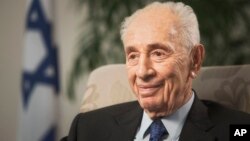Israeli elder statesman Shimon Peres is in “serious but stable” condition after suffering a major stroke Tuesday. He is in a medically-induced coma at the Intensive Care Unit of a Tel Aviv area hospital after experiencing significant bleeding in the brain.
As the nation nervously watched and waited, Peres survived the night and his condition improved.
“All the parameters are stable: blood pressure, heart rate, blood saturation,” Peres’ son-in-law and personal physician Rafi Walden told reporters, adding that this gave him a “certain optimism.” “The chances of survival are pretty good. As for the degree of neurological recovery, nobody can say at this early stage.”
Doctors encouraged by test
"We are happy to remark that when the sedation was a little lessened he was reactive," Walden said. "We'll keep very close to him during the day; and hopefully next time when the sedation will be lessened we hope we are going to be able to get in touch with him."
Peres is 93 years old and despite suffering a mild heart attack in January, he has been active in public life since then with a grueling schedule. Walden said that prior to the stroke, he was in “perfect condition.”
Peres has been in the forefront of Israeli public life for nearly 70 years. He served twice as prime minister, along with extended terms as foreign, defense and finance minister.
Ironically, he earned the label “the loser” because he ran for office five times between 1977 and 1996 but never won a national election. Rather, he inherited the post of prime minister twice, for instance, after Prime Minister Yitzhak Rabin was assassinated in 1995.
Peres losing streak finally ended in 2007 when he won the ceremonial office of president. He was widely acclaimed as an outstanding ambassador for Israel in the role of the “moral voice of the nation.”
Nobel winner
Peres was a hawk-turned-dove and this was embodied in two key roles. First, in the 1950s, he became the father of Israel’s nuclear program.
While Israel has never admitted it, experts believe the Jewish state possesses some 200 atomic warheads, making it the only nuclear power in the Middle East. For Peres, and others, the nuclear program serves as the ultimate deterrent for a tiny nation surrounded by Arab and Muslim enemies.
The ultimate about-face came in the 1990s when he became the architect of the historic Oslo Accords with the Palestinians, signed with much fanfare on the White House lawn in 1993. The following year, Peres won the Nobel Peace Prize along with then Israeli Prime Minister Yitzhak Rabin and Palestinian leader Yasser Arafat. The treaty was revolutionary because most Israelis had long regarded Arafat as an archenemy and arch-terrorist.
At the Nobel ceremony, Peres spoke of a “New Middle East ... A Middle East without wars, without enemies, without nuclear warheads ... There was a time when war was fought for lack of choice. Today, peace is the no-choice option.”
Under Oslo, Israel handed over the Gaza Strip and six of the largest Arab cities in the West Bank to the newly-established Palestinian Authority headed by Arafat.
But Peres’ credibility was badly shaken at home after a wave of deadly Palestinian suicide bombings against Israeli civilians. These attacks caused him to lose national elections in 1996 to the hawkish Oslo opponent Benjamin Netanyahu, who is in his fourth term as prime minister today.
When Peres ended his seven-year term as president in 2014, he remained highly visible in public life, meeting foreign diplomats and celebrities, promoting Israeli hi-tech, inventions and products, and sending out frequent posts on his Facebook page. He was especially active in the Peres Center of Peace, which promotes coexistence between Jews and Arabs.




